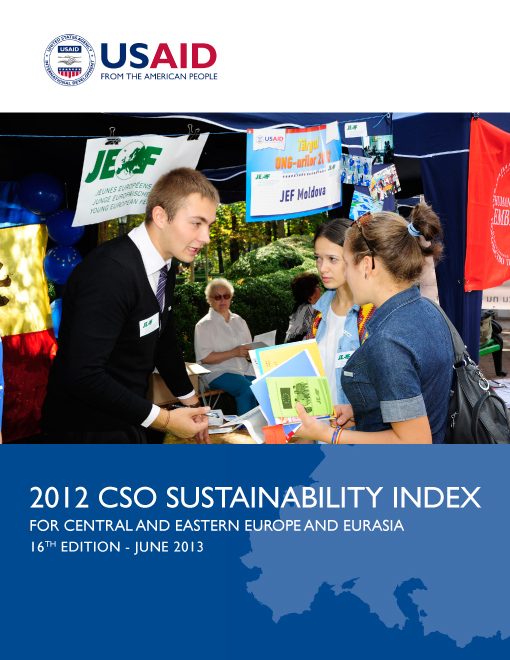- What We Do
- Agriculture and Food Security
- Democracy, Human Rights and Governance
- Democracy, Human Rights and Governance Strategy
- Supporting Free and Fair Elections
- Supporting Vibrant Civil Society & Independent Media
- Protecting Human Rights
- Promoting Accountability & Transparency
- Importance of Democracy, Human Rights, & Governance to Development
- Countering Trafficking in Persons
- Economic Growth and Trade
- Education
- Ending Extreme Poverty
- Environment and Global Climate Change
- Gender Equality and Women's Empowerment
- Global Health
- Water and Sanitation
- Working in Crises and Conflict
- U.S. Global Development Lab
CSO Sector Development in 2012
CSOSI Data 1997-2012
[MS Excel, 38KB]
Albania
Armenia
Azerbaijan
Bulgaria
Belarus
Bosnia and Herzegovina
Croatia
Czech Republic
Estonia
Georgia
Hungary
Kazakhstan
Kosovo
Kyrgyzstan
Lithuania
Latvia
Moldova
Macedonia
Montenegro
Poland
Romania
Russia
Serbia
Slovakia
Slovenia
Tajikistan
Turkmenistan
Ukraine
Uzbekistan
Civil society organizations (CSOs) in Central and Eastern Europe and Eurasia showed some positive movement towards sustainability in 2012 in spite of a growing number of new restrictions imposed on civil society. Across the region, CSOs are forging into more arenas and engaging citizens and governments in new ways, such as a push towards new advocacy agendas and acceleration in online communication. However, several ongoing challenges persist, including the use of legal restrictions to constrain civil society, continued financial hardship, lagging transparency measures, and strong regional disparities, which threatens to halt, or even reverse, continued positive CSO sector development. Despite the challenges, the practice of citizens working together to solve their own problems is becoming ingrained in all countries in the region to the extent that they are now permanent fixtures in society. Whether fighting for the rights of children with dyslexia in Latvia, pushing for a referendum on the import of non-hazardous waste in Albania, or promoting HIV/AIDS prevention and testing in Uzbekistan, CSOs across Central and Eastern Europe and Eurasia are actively responding to the challenges their countries face.
BACKGROUND
The Civil Society Organization Sustainability Index (CSOSI) has been used since 1997 to assess the sustainability of the CSO sector. The Index has expanded considerably since its inception – it went from covering 18 countries in the Europe and Eurasia Region, to covering over 60 countries in different regions around the world. By using standard indicators and collecting data each year, the CSOSI enables users to track developments and identify trends in the CSO sector over time while allowing for cross-country and cross-region comparison. It is used by CSO advocates, development partners, and academics to assess international and regional trends in the civil society sector and to identify common obstacles impeding the sector's sustainability, such as the legal environment, organizational capacity, and financial viability.
APPROACH
The Index measures the sustainability of each country's CSO sector based on the CSOSI's seven dimensions: legal environment, organizational capacity, financial viability, advocacy, service provision, infrastructure, and public image. The CSOSI's local implementing partners in each country lead the process of organizing and convening a diverse and representative panel of CSO experts. Country panels discuss the seven dimensions for the year being assessed, and reach consensus on the scores corresponding to each dimension. With the information provided by the expert panel along with desk research, the CSO implementing partner then develops a narrative report.








Comment
Make a general inquiry or suggest an improvement.